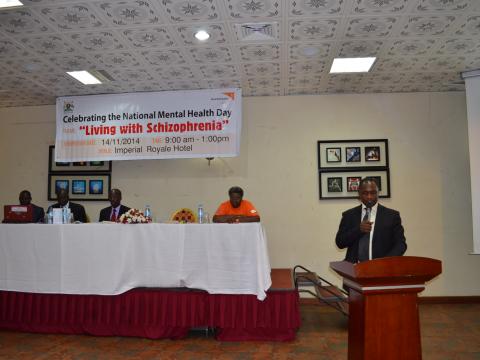World Vision pilots mental health programme in three districts

By AKWII SUZAN OTTO
Project Coordinator-MHGAP
WORLD VISION UGANDA
Mental, neurological, and substance use (MNS) disorders are common in all regions of the world, affecting every community and age group across all income countries. While 14% of the global burden of disease is attributed to these disorders, most of the people affected (75%) are in many low-income countries and do not have access to the treatment they need.
The WHO Mental Health Gap Action Programme (mhGAP) aims at scaling up services for mental, neurological and substance use disorders for countries especially with low- and middle-income. The Programme asserts that with proper care, psychosocial assistance and medication, tens of millions could be treated for depression, schizophrenia, and epilepsy, prevented from suicide and begin to lead normal lives– even where resources are scarce.
World Vision Australia is funding the implementation of mhGAP in Uganda as one of the pilot countries in Africa. The implementation is done by Ministry of Health in partnership with the World Health Organization (WHO). The Uganda mhGAP project aims to improve the wellbeing of girls, boys, women and men affected by MNS disorders by improving the environment for delivery of quality MNS services at all levels of PHC, improving capacity of human resources to provide MNS services at with PHC, and by improving access and utilization of MNS services for people with MNS disorders within PHC by community members in 3 selected districts of Kamuli, Jinja and Kitgum.
So far the project has managed to develop, print and disseminate an MNS policy guideline, IEC materials, Mental Health strategic plan, training and support supervision guides. We have also trained prescribers (medical officers, medical clinical officers and nurses) in mental health care using the mhGAP intervention guide; Training of Village Health Teams (VHTs) to able to recognize, and refer MNS patients; the project also sensitized and orientated district leaders and stakeholders to lobby for their support towards this noble course.
Now that capacity of human resources has been built, in this financial year the project will focus on treatment of depression among people affected by the LRA war atrocities in Kitgum. The project will also emphasize on follow up, monitoring and supervision of the trained health workers in health facilities for feedback and checking on progress in order to ensure that knowledge is translated into practice in all districts of project implementation.
With MHGAP intervention there is hopeful that mental health services will be integrated in the national health care plan and implemented at all levels of PHC for the improved wellbeing of boys, girls, women and men affected by MNS disorders.